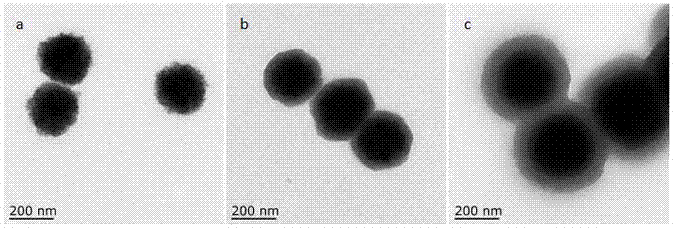Magnetic composite microspheres, and preparation method and application thereof
A magnetic composite microsphere and microsphere particle size technology, which is applied in the direction of microsphere preparation, biochemical equipment and methods, magnetic materials, etc., to improve enzyme activity recovery ability, temperature stability, good reusability, and temperature stability Improved effect
- Summary
- Abstract
- Description
- Claims
- Application Information
AI Technical Summary
Problems solved by technology
Method used
Image
Examples
Embodiment 1
[0044] Example 1: Fe 3 O 4 Synthesis
[0045] Dissolve 1.350g of ferric chloride hexahydrate in 70mL of ethylene glycol, add 3.854g of ammonium acetate, 0.400g of trisodium citrate, stir for 1h at an oil bath temperature of 170℃ until the solution becomes a homogeneous system, and transfer to the PTFE lining The stainless steel reactor was heated to 200℃ for 16h. After taking it out, it was cooled to room temperature, the product was magnetically separated, washed with ethanol until the supernatant was transparent, and dried in a vacuum drying oven at 50°C to a constant weight.
Embodiment 2
[0046] Example 2: Fe 3 O 4 @ SiO 2 -Synthesis of p (GMA-co-NIPAM)
[0047] (1) Fe 3 O 4 @ SiO 2 -Synthesis of MPS
[0048] 0.1 g of the product Fe in Example 1 3 O 4 Disperse in 15 mL of a 4:1 volume ratio of ethanol and water mixed solution, then add 1 mL of ammonia solution, mechanically stir and slowly drop 0.5 mL of TEOS into the system, and react at room temperature for 6 hours. Add 0.3mL MPS into the system and continue to stir and react for 12 hours. The product was separated magnetically and washed several times with ethanol. Dry to constant weight in a vacuum drying oven at 50°C.
[0049] (2) Fe 3 O 4 @ SiO 2 -Synthesis of p (GMA-co-NIPAM)
[0050] Take 50mg Fe 3 O 4 @ SiO 2 -MPS in a single-neck flask, add 40mL acetonitrile ultrasonic dispersion for 3min, add 50mgNIPAM, 0.05mL GMA, 100mg crosslinker MBA, 4mg initiator AIBN, oil bath heating flask, install fractionation column, condenser, receiver. The reaction flask was heated to boiling within 30 minutes from roo...
Embodiment 3
[0051] Example 3: Fe 3 O 4 @ SiO 2 -Synthesis of p (GMA-co-NIPAM)
[0052] (1) Fe 3 O 4 @ SiO 2 -Synthesis of MPS
[0053] Add 0.5 g of the product Fe in Example 1 3 O 4 Disperse in 90 mL of a 4:1 volume ratio of ethanol and water mixed solution, then add 3 mL of ammonia solution, mechanically stir and slowly drop 1.2 mL of TEOS into the system, and react at room temperature for 24 hours. Add 1.5 mL MPS into the system, and continue to stir and react for 48 hours. The product was separated magnetically and washed several times with ethanol. Dry to constant weight in a vacuum drying oven at 50°C.
[0054] (2) Fe 3 O 4 @ SiO 2 -Synthesis of p (GMA-co-NIPAM)
[0055] Take 100mg Fe 3 O 4 @ SiO 2 -MPS in a single-necked flask, add 80mL acetonitrile ultrasonic dispersion for 3min, add 150mg NIPAM, 0.15mL GMA, 200mg crosslinker MBA, 10mg initiator AIBN, oil bath heating flask, install fractionation column, condenser, receiver. The reaction flask was heated from room temperature to...
PUM
| Property | Measurement | Unit |
|---|---|---|
| particle diameter | aaaaa | aaaaa |
Abstract
Description
Claims
Application Information
 Login to View More
Login to View More - R&D
- Intellectual Property
- Life Sciences
- Materials
- Tech Scout
- Unparalleled Data Quality
- Higher Quality Content
- 60% Fewer Hallucinations
Browse by: Latest US Patents, China's latest patents, Technical Efficacy Thesaurus, Application Domain, Technology Topic, Popular Technical Reports.
© 2025 PatSnap. All rights reserved.Legal|Privacy policy|Modern Slavery Act Transparency Statement|Sitemap|About US| Contact US: help@patsnap.com



